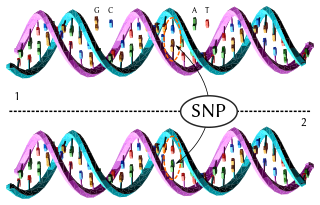單核苷酸多態性(英語:Single-Nucleotide Polymorphism,簡稱SNP,讀作/snɪp/)是DNA序列中單個核苷酸的替代導致的、且分布於種群中相當一部分個體(如:1%以上)中的基因多樣性。例如,對於某種生物,同一位置基因組片段一部分為AAGCCTA,另一部分為AAGCTTA,則認為此處存在SNP、兩種基因型屬於等位基因。

幾乎所有常見的單核苷酸多態性(SNP)位點只有兩個等位基因。單核苷酸態性(SNP)位點的分布是均勻的,在非編碼區比在編碼區更常見。一般來說,自然選擇傾向於保留最益於遺傳適應性的單核苷酸多態性(SNP)位點。[1]其他因素,如基因重組和突變率也可判斷單核苷酸多態性(SNP)位點的密度。 [2]
單核苷酸多態性(SNP)的密度可以通過微衛星DNA進行預測。AT微衛星是單核苷酸多態性(SNP)密度有效的檢測方式,在單核苷酸多態性(SNP)顯著降低及較低GC含量的區域,AT出現大片重複。 [3]
在一個種群中,單核苷酸多態性(SNP)可以以次要等位基因頻率的形式體現,即那些等位基因頻率很低的基因座。單核苷酸多態性(SNP)等位基因的頻率在不同人群中具有差異性,因此,常見於某地區或民族的單核苷酸多態性(SNP)等位基因在其他的地區或民族則可能很少見。
DNA指紋圖譜是指個體間的遺傳變異(尤其是在基因組的非編碼區),常被用於法醫學。同時,這些遺傳變異也構成了人體對疾病易感性的差異,以及疾病的嚴重程度及治療效果的差異。例如,載脂蛋白E(APOE)的單鹼基突變與阿爾茲海默病發生低風險相關。[4]
人類遺傳基因的各種差異,90%可歸因於SNP引起的基因變異。在人類基因組中,每隔100至300個鹼基就會存在一處SNP位點。每3個SNP位點中有2個會是胞嘧啶(C)和胸腺嘧啶(T)的相互轉變。
類型
| SNP類型 |
|---|
|
單核苷酸多態性(SNP)根據其在基因中的位置,可以分為基因編碼區、基因非編碼區、基因間隔區(基因之間的區域)。由於基因序列的簡併性,含有編碼序列的單核苷酸多態性(SNP)不一定會改變蛋白質的氨基酸序列。
編碼區的單核苷酸多態性(SNP)有兩種類型:同義和非同義。同義單核苷酸多態性(SNP)並不影響蛋白質序列,而非同義單核苷酸多態性(SNP)則會改變蛋白質的氨基酸序列。
不在蛋白質編碼區的單核苷酸多態性(SNP)仍可能影響基因剪接、轉錄因子結合、信使RNA降解或非編碼區的RNA序列。受到這種單核苷酸多態性(SNP)影響的基因表達被稱為單核苷酸多態性表達(ESNP),可能發生在此基因的上游或下游。
單核苷酸多態性(SNP)可能分布於編碼基因段或非編碼基因段。由於存在冗餘基因序列,編碼段中的單核苷酸多態性(SNP)不一定會影響蛋白質中的氨基酸序列。
利用及重要性
人類DNA序列的變化可以影響人類疾病的發展和對病原體、化學品、藥品、疫苗等的機體反應。單核苷酸多態性(SNP)也是個性化醫療的關鍵。[5]然而,在生物醫學中最重要的是在全基因組關聯研究中比較同類基因組的不同區域。
單核苷酸多態性的研究在農作物和家畜育種項目中也很重要。識別單核苷酸多態性各種方法的詳細信息,請參閱單核苷酸多態性基因分型。
單核苷酸多態性(SNP)通常是雙等位基因,因此容易檢測分析。[6]單個的單核苷酸多態性(SNP)可能導致孟德爾疾病。對於骨質疏鬆症這種更複雜的疾病,一個位點的單核苷酸多態性(SNP)通常不能單獨起作用,而是與其他位點的單核苷酸多態性(SNP)相互作用而表現出病情。 [7]
截至2012年6月26日,單核苷酸多態性數據庫(dbSNP)已列出人類的53,558,214個單核苷酸多態性(SNP)位點。 [8]單核苷酸多態性(SNP)位點已被用於全基因組關聯研究(GWAS),例如,基因圖譜中的高分辨率標記與疾病或正常的特徵有關。單核苷酸多態性(SNP)的知識將有助於了解藥物的代謝動力學(PK)或藥效動力學,即在不同的遺傳變異個體中藥物是如何發揮作用的。單核苷酸多態性(SNP)可能會導致廣泛的人類疾病,如癌症、傳染性疾病(艾滋病,麻風病,肝炎等)、自體免疫性疾病、神經精神性疾病、鐮狀細胞貧血、β地中海貧血症及囊性纖維化等。[9][10][11]與不同單核苷酸多態性(SNP)相關的疾病將可能成為藥物治療的主要基因組目標。 [12]某些單核苷酸多態性(SNP)與不同藥物的代謝有關。[13][14][15]因其世代中的數量及穩定遺傳,對表型沒有影響的單核苷酸多態性(SNP)在全基因組關聯研究(GWAS)中也仍然有用。 [16]
舉例
數據庫
生物信息學數據庫用於對單核苷酸多態性(SNP)相關研究的檢索。單核苷酸多態性數據庫(dbSNP)信息來自生物技術信息中心 (NCBI)。以下列出一些常用SNP相關的數據庫:
| 數據庫或工作組名稱 | 主要特點 |
|---|---|
| SNPedia(頁面存檔備份,存於網際網路檔案館) | 維基風格的數據庫,可用於支持人類基因組注釋,解釋和分析 |
| OMIM數據庫(頁面存檔備份,存於網際網路檔案館) | 描述多態性與疾病之間的關聯(例如以文本形式給出疾病) |
| 人類基因突變數據庫(頁面存檔備份,存於網際網路檔案館) | 提供人類遺傳性疾病和功能性單核苷酸多態性(SNP)的基因突變 |
| 全基因組關聯分析中心(頁面存檔備份,存於網際網路檔案館) | 允許用戶查看目前單個或多個全基因組關聯研究(GWAS)的大體水平 |
| 國際單核苷酸多態性(SNP)圖譜工作組 | 通過校對嵌入的較大克隆體的基因組序列繪製出基因庫中每個單核苷酸多態性(SNP)的周圍序列[20] |
| 國際人類基因組單體圖譜計劃 | 在每個項目中研究能識別標記的單核苷酸多態性(SNP)用於確定單倍體的採集 |
命名
單核苷酸多態性(SNP)的命名可能容易混淆:單個的單核苷酸多態性(SNP)可能有幾種表現形式,並且尚未達成共識。其中一種單核苷酸多態性(SNP)的書寫形式是採用前綴,以及周期和「大於」符號來表示野生型和改變後的核苷酸或氨基酸,如c.76A>T。[21][22][23]如上文所示,通常採用核苷酸多態性數據庫的rs號來表示。
單核苷酸多態性(SNP)分析
用於發現新SNP及檢測已知SNP的分析方法包括:
單核苷酸多態性模擬及標籤單核苷酸多態性 (tag SNP) 免費工具:
- GWAsimulator
- PLINK(模塊)
標籤單核苷酸多態性(SNP)表示基因組中具有高的連鎖不平衡的區域中具有代表性的單核苷酸多態性(tag SNP)。它可以識別遺傳變異和關聯的表型基因分型,而無需在染色體區域每個單核苷酸多態性(SNP)進行基因分型,這減少了與疾病相關的基因組分型(genotyping)的費用和時間,因為它不需要研究每一個個體的單核苷酸多態性(SNP)。國際HapMap計劃其中一個應用是由人類基因組圖譜,獲得標籤SNP信息,從而減少了遺傳研究的基因組分型的費用和時間。[27]
Tagger是一種可用於評估基因型數據和選擇標籤單核苷酸多態性 (tag SNP) 的工具,可用於如國際HapMap項目的資料。它是由保羅·德·巴克(Paul de Bakker)在馬薩諸塞州醫院(Massachusetts General Hospital)人類遺傳研究中心和哈佛醫學院Broad研究院的大衛阿特舒勒和馬克 - 達利在中心(Labs of David Altshuler and Mark Daly)的實驗室開發。[28]
CLUSTAG和WCLUSTAG是免費軟件,包含集群和覆蓋算法(cluster and set-cover algorithms)來獲得一組標籤單核苷酸多態性(tag SNP)位點,用來代表一個染色體區域所有已知的單核苷酸多態性(SNP)。該程序用Java實現,並且可以在Windows平台和Unix環境中運行。它們是由區小勇(SIO IONG AO)等人在香港大學開發的。[29][30]
參考文獻
外部連結
Wikiwand in your browser!
Seamless Wikipedia browsing. On steroids.
Every time you click a link to Wikipedia, Wiktionary or Wikiquote in your browser's search results, it will show the modern Wikiwand interface.
Wikiwand extension is a five stars, simple, with minimum permission required to keep your browsing private, safe and transparent.
